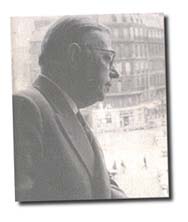
Home | Help | Contacting Me | Orientation | Directory for this Course


Contrasts with Heidegger, Kierkegaard:
Selections from Nausea illustrative of various ideas:
Consciousness and Consciousness of Self
en soi / pour soi
Reflected vs. Unreflected Consciousness: Unlike the traditional distinction
between consciousness of objects and consciousness of self, Sartre's distinction
is between consciousness which "positions" the self in relation
to some content and consciousness which presents some content. Crucially,
unreflected consciousness does not involve a lack of awareness of the content
as a product of consciousness, it just does not represent that content
as posited by the self's consciousness.
The Ego is Transcendent not Transcendental
Freedom and Action
Consider the reversal of the problem of determinism in Jones's example at 384.
Since we are social beings, choice involves "choosing for all mankind" (385)
I. Objections to Existentialism
II. Definition of Existentialism
A. Central Ideas
1. Existence Precedes Essence
Atheistic existentialism is consistent with the belief that there is NO PRE-EXISTING CONCEPT OF MAN (either outside him or inside him).
There is no "human nature" as such...
Human beings are thrown into a world: we DEFINE OURSELVES through our ACTIONS AND CHOICES. In this sense, we "exist" first and then become who we are (our "essence"):
Thus, for Human Beings as radically free, EXISTENCE PRECEDES ESSENCE.2. We must begin with the Subjective
Sartre understands the 'subjectivism' of the subject on two levels:
A. The freedom of the individual subjectThis relates to our individual freedom ("that each must choose himself")
B. The realization that we cannot pass beyond 'human subjectivity'
This refers to something like Nietzsche's demand for a REVALUATION OF ALL VALUES.
For Sartre, this "collapse of all values into man" brings into existence the ethical dimension of our fundamental choices: Our radical freedom becomes bound to a radical responsibility.B. Key Terms
The existentialist's understanding of "subjectivity" -- based on both a radical sense of freedom and the collapse of all values into the human sphere -- is the context for understanding the following terms:1. Anguish
While I "choose for all mankind," I am aware that I am the ultimate ground for my choice. That is, I am radically responsible at the same time that I am aware of the total absence of any (objective) justification for my choice/action.
I carry out my choices in "the mood of anguish..."2. Abandonment
One of the consequences of the Death of God is that we have been "left to ourselves." There is no longer any "external command" or "inner law" to guide us in our choices/actions.
Abandoned in the complexity and ambiguity of human situations, we are forced to "invent" our solutions. As with Sartre's example of the student, we accomplish this ultimately through our anguished choices.3. Despair
By "despair" Sartre means, as in the example of the student, that it is not at all clear how things will "work out" -- that in the future he may come to view his decision in a different way, etc.
This uncertainly with regard to the future -- an uncertainly guaranteed by our state of abandonment -- is the condition of our state of despair. Our responsible choices occur within a world void of ulterior design and in this sense we must have the courage to conquer ourselves and act "without hope" (that, for instance, God knows the outcome, etc.).
III. Overcoming the Objections
IV. Definition of Humanism
A. Classical Humanism
B. Existentialist Humanism
V. Conclusion: Existentialism is a Humanism
©1997 by Mark Alfino, Department of Philosophy, Gonzaga University.